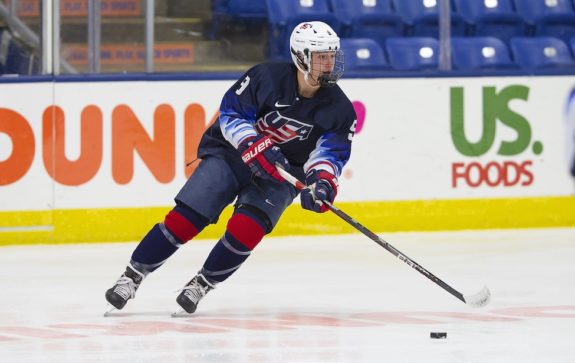There were some good sights mingled with a lot of bad for the San Jose Sharks in their Global Series opener against the Nashville Predators. Last season’s haunting issues lingered into the season-opening series, thus providing no indication that the 2022-23 season will be any different than the previous three. If not for a strong final frame in the second game of a back-to-back, there would be almost no positive takeaways. But since many of the negatives can be cleaned up, we’re going into this with a glass-half-full perspective. So, let’s reflect on what we learned from Team Teal in their dismal 0-2 start to the season.
The Sharks Allowed the Predators Unnecessary Time and Space
Not to discredit a speedy Predators team, but Nashville only took what the Sharks gave them, which was a lot of unnecessary time and space. Team Teal permitted Nashville to enter the zone with possession with ease thanks to Sharks defenders backing themselves into their own end. This was the primary reason for San Jose being hemmed in the defensive zone for long stretches. Among the numerous San Jose blunders to choose from, one goal pretty much summed up all the Sharks’ problems in one play.
There are two defensemen at fault here in a play that involves way too much gliding and not enough physicality. First, notice no.5, Matt Benning, back off the play instead of playing the body after Nino Niederreiter enters the zone. This is why the cliche of taking away time and space is so important. If he simply continues his stride into no. 22, the forward is stapled to the boards or cut off with no room to skate. Instead, that split-second hesitation and glide allows the forward space and time to pivot to his right before passing to the trailing Ryan Johansen.
What happens next just can’t happen at the NHL level. Jaycob Megna gets caught puck-watching at a standstill, waiting for Johansen to make a play instead of stepping up to the puck carrier to play the body. As a result, his stagnancy buckles him, allowing the Predators forward to skate around him with ease, making a decent deke look far better than it is.
Related Links: Sharks Global Series Performance Indicates Tough Season Ahead
To cap it all off, Benning is then beaten to the front of the net on the rebound for the goal. Both subsequent plays could’ve been prevented by stepping up to the puck carrier with minor physicality. The good news is, blunders like this in the defensive zone are fixable, and they’ll need resolving if San Jose wants to prevent its most disastrous season of the last four years.
Third-Period Dominance Provides Glimpses of Potential Identity
It’s easy to overlook San Jose’s dominating final period over the Predators after playing five periods of forgettable hockey. But the Sharks flipped a switch in the third period of game two. Unlike last season’s dismal performances in one-goal games, the Sharks had the opposition on their heels, outshooting Nashville 15-3 in the final frame. Team Teal poured on the pressure in all three zones, most notably by standing the Preds up at the defensive blue line.
This solid front allowed the Sharks to counterattack with dangerous rushes of their own. For the first time, Sharks fans witnessed at least a glimpse of the suffocating system the new coaching staff is seeking to implement. After some cleaning up and more in-your-face play, San Jose could look much crisper in their home opener. Head coach David Quinn mirrored these sentiments in a postgame press conference following the team’s 3-2 loss.
Progress seems to be the buzzword in San Jose to start the year, which is what they accomplished in their sixth period of play in Prague. If the Sharks can build upon the positive signs, they may be able to salvage what is otherwise expected to be a lost season in San Jose.
The New System Is a Work in Progress
If there’s one thing that was most evident in San Jose’s 0-2 start, it’s that old habits die hard. Implementing a new system is a gradual process that takes cleansing old habits and establishing new ones. Many of the Sharks’ bad habits from last season were very glaring in the two-game set. A shortened training camp prior to their trip to Berlin didn’t help matters for a team facing an identity crisis under a new coaching staff. Unfortunately, the first 10 games of the season could end up being an extended preseason for a Sharks’ squad attempting to redefine themselves in 2022-23.
Patience will be key for the Sharks as they grow into their new style of play. That patience will include having to wait on the development of their top two prospects, William Eklund and Thomas Bordeleau who were reassigned to the San Jose Barracuda of the American Hockey League (AHL).

Patience is easier said than done for a team that has missed the playoffs for three straight seasons. The Sharks prospect pool and Team Teal as a whole will need to grow together, and that’s ok. With a suddenly stacked Barracuda squad and a more solidified bottom six on the big club, new general manager Mike Grier has Team Teal steered in the right direction.
The Sharks Long Journey Home
The good news is San Jose will have plenty of time to reflect on their dismal 0-2 start in Prague before their home opener on Oct. 14. The bad news is it doesn’t get any easier against former teammate Brent Burns and the Carolina Hurricanes. One thing’s certain, things can’t go much worse for Team Teal. They’ll be on Sharknado watch when they take on the Hurricanes, hoping not to be a victim of another disaster. The Sharks will have to clean up the finer details of their game if they wish to take Carolina by surprise at the Tank on Friday night.
Original concept by Josh Fitzpatrick
